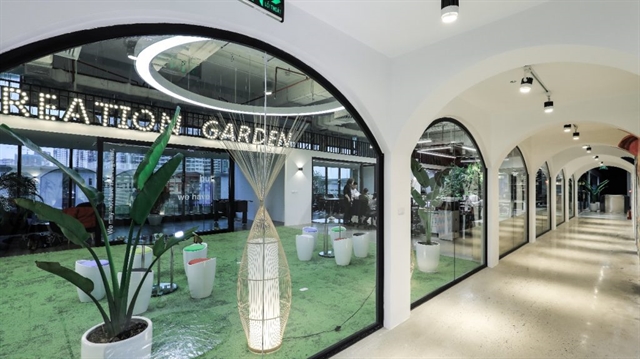 Society
Society

Firms in Việt Nam, like others across the world, have been suffered negative impacts due to the pandemic, with many bankrupt, dissolved, suspended or downsized.

|
| A working corner at Happitopia Hub. — Photo Courtesy of Happitopia Hub |
Bích Hường
HÀ NỘI — As Việt Nam has effectively controlled the COVID-19 pandemic and entered a 'new normal' since late April, daily and business activities have also restarted.
Firms in Việt Nam, like others across the world, have been suffered from negative impacts due to the pandemic, with many bankrupt, dissolved, suspended or downsized.
To give some businesses a boost at this crucial juncture, Happitopia Academy launched 1,000 scholarships worth a total VNĐ50 billion (US$2.1 million) to train people working for small- and- medium-sized companies, start-ups, business households and young people with a passion for business.
The winners will have the opportunity to attend training courses including those on real estate, start-ups, human resources, marketing and sales starting in July.
In late May, the business academy founded by well-known businessmen in Việt Nam hosted a series of conferences with leading experts discussing business difficulties in real estate, hotels, tourism, restaurants, agriculture and start-ups.
Nguyễn Đỗ Lăng, chairman of real estate Apec Group and co-founder of Happitopia Academy, said Vietnamese start-ups still did not know where to go to share their ideas and ask for advice.
“Youths have an endless source of creativity and new ideas but it is a process to realise the ideas,” Lăng said.
“Now, Việt Nam has centres for supporting start-ups where they can listen to the stories of young entrepreneurs and the start-up community but I think that it is not enough,” Lăng said.
“Doing business is an experience,” he said, adding that business people needed more than academic lessons to succeed.
Lăng emphasised learning from the experiences of senior entrepreneurs and practical lessons could be worth millions of dollars and help them to avoid mistakes.
“I used to struggle with starting my own business. I succeeded and I failed times but I recognised that many Vietnamese start-ups are usually lonesome on the never-easy path of running a business,” Lăng said.

|
| Chairman of real estate Apec Group and co-founder of Happitopia Academy, Nguyễn Đỗ Lăng (second from left) is in a conferemce on real estate organised by the academy on May. — Photo courtesy of Happitopia Hub |
Help from seniors
When thinking about start-ups, young people need to be equipped with basic knowledge and skills to identify their abilities, Lăng said, adding that they also need to be prepared for challenges, risks and even failure which lie ahead.
“Lacking experience is blamed for their failure in some cases while experience is what their seniors have a lot of,” he said.
“It’s why it is necessary to set up a mechanism which connects the start-up community, Government and business circle regularly to exchange experiences,” he said, adding that direct communication would help solve problems and make use of collective strengths.
Happitopia Academy was opened early this year for just this reason with its co-founders including high-profile businessmen in Việt Nam like Đào Ngọc Thanh from Vinaconex, Lăng from Apec Group, Phạm Đình Đoàn from Phú Thái Holding, Đào Thế Vinh from Golden Gate Group and Nguyễn Mạnh Hùng from Thái Hà Book.
The non-profit academy hopes to train one million young entrepreneurs in the next 10 years according to an agreement signed between Apec Group and the Government project 844 on supporting start-ups and innovation.

|
| Creation Garden - a green space in the hub designated for relaxation and inspiration. — Photo courtesty of Happitopia Hub |
Happitopia Academy is part of Happitopia Hub, which consists of the academy, a G2G incubation and Happitopia Capital.
At the G2G incubation, young businessmen are expected to find their strengths, identity and business motto, helping them go from “Good” to “Great” in business.
Happitopia Capital worth US$5 million is designed to offer financial assistance to ideas in technology, finance, tourism, culture, art, education and environment. The fund will work with projects from the idea-forming stage, trial and practical implementation so that the fresh ideas of start-ups will get sufficient resources to thrive.
Located at Grand Plaza, 117 Trần Duy Hưng Street, Hà Nội, Happitopia Hub also offers a co-working space, public space for meetings, labs, a creation garden, gym and spa room and lactation rooms for working mothers.
'Happitopia' is the combination of 'happiness', 'utopia' and 'capital'.
Lăng said that co-founders expected to make Happitopia Hub a land of happiness, innovation and sustainability for both big and small businesses.
“We want to help nurture a new generation of start-ups that work for the happiness of not only individuals but the community,” Lăng said.
In Việt Nam, statistics showed that there was a start-up for every 59,000 people – a high rate of start-ups but few of them can survive without proper investment.
Among the main reasons for the problem is that the start-ups struggle to mobilise external resources, particularly funding.
“It’s also necessary for them to learn experience from senior entrepreneurs and experts so they can step up more confidently,” Lăng said.
Basic factors that any start-up should think about first include the new idea, market understanding, timing, business size, human resources, funding, technology, operation, production chain and supply chain.
“Among those factors, Việt Nam’s start-ups have advantages in ideas and enthusiasm but mostly lack other decisive factors,” he said.
Nguyễn Quang Huy, a co-founder of Happitopia, said young entrepreneurs built the future of the nation and its economy.
“Start-ups need to understand and have sympathy to work for good deeds in society,” he said.
Huy said that the Happitopia Hub expected to become a bridge connecting entrepreneurs so they would build a community of kind entrepreneurs who together solve social problems. — VNS




